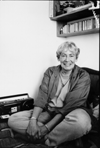Meet the high priestess of science fiction
July 27, 1997
Elisabeth Sherwin -- gizmo@
dcn.davis.ca.us
Ursula K. LeGuin is the prolific high priestess of science fiction. She has written more than 16 novels, four collections of poetry, 10 children's books, several screenplays and more. She collects awards like jewelry but wears them modestly.
LeGuin, 67, was born in Berkeley, the daughter of two anthropologists. She attended Radcliffe and earned her master's from Columbia. She currently lives in Oregon, her home for many years. She has been a writer from her earliest years and her short stories and poems are anthologized regularly.
"Nebula Awards 31" is a collection of works chosen by Science Fiction and Fantasy Writers of America and it includes a LeGuin short story, "Solitude." This story explores themes that LeGuin has focused on recently: love and sex in a fractured society with minimal community bonds.
She came to UC Davis earlier this month. She chose to speak to a capacity crowd on a hot summer night about a book she wrote several years ago, "Always Coming Home."
"This is my most California book," she said. In it, she wanted to explore the formation of a new society from a native point of view.
"I knew not to do two things," she said. "I knew I could not imitate other Native American voices and I knew I could not write a piece of sentimental thievery. But if I omitted the Native American voice, would I not be guilty of silencing it?"
She hit on the technique of setting this new society several thousand years in the future and expressing the indigenous Californians via translation from a fictitious dead language.
"I had to give up plot and convention and imagine what it might be like to go slow all my life...the result is the most California writing I have ever done,"
she said.
However, many people associate LeGuin strictly with science fiction, remembering her ground-breaking "The Left Hand of Darkness," not the stories about native peoples. LeGuin might argue it's all the same thing - an exploration of cultures, how humans create and recreate societies.
A man in the audience spoke up. "I notice you haven't been writing any science fiction," he said.
"Yes, I have," said LeGuin. " 'Four Ways to Forgiveness' is a beautiful book."
It also is an example of what she calls linked-stories. The novellas in "Four Ways" are interconnected.
"Things seem to be coming to me in novella size, which I love," said LeGuin. "And then sometimes the stories seem to link. I am seeking desperately for a name for that form. The British contemptuously call it a fix-up ... if anybody thinks of a good name let me know."
LeGuin is fascinated by the problems human beings have living in societies. The problem with utopias, she says, is that we have no way to get there. "That's why we have novels," she said. "Any real change of direction in our society is enormously difficult because so many people are involved." Maybe that's why she's attracted to smaller more manageable societies like native villages.
LeGuin admits she keeps her readers on their toes.
"I move around from science fiction to what they call kiddie lit. In the late '80s I said that science fiction wasn't working for me. I had to regroup and rethink. But now I seem to be happily going to outer space again. I got over the hump. I've had a lot of dry spells.
"I've been writing for a long time," she continued. "I've gotten stuck thousands of times. You might be 30 or 40 pages into a story when you realize it's dead and if you whip it it's deader. But you save everything your write, put it away, let it cool."
LeGuin said she has studied very little hard science. "My science fiction tends to be social science fiction," she said. "But I try not to make mistakes."
She also has been hailed as feminist whose science fiction breaks and bends gender roles. She said the process of becoming a feminist took place over time.
"I was a timid and conservative feminist at first," she said. "But there were milestones that helped. One was the publication of the Norton Anthology of Literature by Women. I read every word. It was terrific stuff and that was a revelation and a joy. We could write like women instead of honorary men."
 Ursula K. LeGuin is the author of
Ursula K. LeGuin is the author of
"Four Ways to Forgiveness"
305 pages, $5.99
HarperPrism, 1995
and can be found in
"Nebula Awards 31: The Best Science Fiction and Fantasy of the Year"
Edited by Pamela Sargent
331 pages, $13
Harvest, 1997
Photo -- Courtesy
|
[Author Menu] [Date Menu] [Genre Menu] [Printed Matter Home]
The Davis Virtual Market
 Ursula K. LeGuin is the author of
Ursula K. LeGuin is the author of